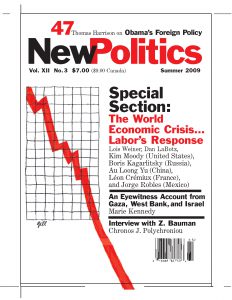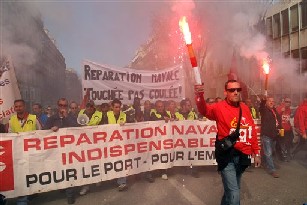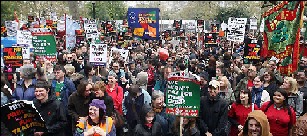Summer 2009 (New Politics Vol. XII, No. 3, Whole Number 47)

FROM THE EDITORS
LETTERS
Diane Hufford’s reply to Betty Mandell and Mandell’s response
SPECIAL SECTION: THE WORLD ECONOMIC CRISIS: LABOR’S RESPONSE
INTRODUCTION, Dan La Botz and Lois Weiner
THE GLOBAL CRISIS AND THE WORLD LABOR MOVEMENT, Dan La . . .
Read more ›
review
The odd disconnect between theorists of ‘difference’ and struggles for social solidarity
IT’S TRAINED ELEPHANTS linked tail to snout contending with accursed builders of The Tower of Babel. That’s pretty much how defenders of discourse on class and identity caricature their opposite theoretical numbers. Not so Joseph Schwartz, who shows why such binary thinking is dangerous. Schwartz instead places economic inequality and politics back into discussions of identity and difference. It’s about time.
Summer 2009 (New Politics Vol. XII, No. 3, Whole Number 47)
IN HIS INTRODUCTION to the Winter 1998 New Politics symposium (Vol. VI, No. 4) marking the 150th anniversary of The Communist Manifesto, Julius Jacobson, co-editor and co-founder of this journal, noted that “symptomatic of the crisis in Marxism” is not only the “failure of the working class to act as the agency for social transformation but the changing nature of the working class itself which is a legitimate area of concern and debate” (p. 47).

Gaza: War on Civilians in the World’s Largest Open-air Prison[1]
CRITICAL THEORY HAS ITS POLITICAL roots in what has been termed “the heroic phase” of the Russian Revolution. This was the period from 1917-1923 in which the radical democratic vision of workers’ councils — or “soviets” — dominated both the communist movement and its radical offshoots.
AS NOAM CHOMSKY OBSERVED, “Obama’s message of ‘hope’ and ‘change’ offered a blank slate on which supporters could write their wishes” (Znet, Nov. 25, 2008). Millions voted for Barack Obama in order to reverse the brutal and catastrophic foreign policy of the Bush Administration, especially the war in Iraq. But as far as fundamental change is concerned, his first months in office (this is being written in mid-April) offer no real grounds for hope.
TRANSLATED BY DAN LA BOTZ To the memory of Dale Hathaway and Antonioin Villalba IN ORDER TO EVALUATE AND UNDERSTAND the current situation of the workers’ movement in Mexico as power has shifted from the Institutional Revolutionary Party (PRI) to the National Action Party (PAN), it is important to understand the character of the Mexican regime and its historical development. Does a change in the ruling party represent the beginning of a democratic transition and a change in the system?
TRANSLATED BY MICHEL VALE THE RESTORATION OF CAPITALISM on the territory of the former Soviet Union was accompanied not only by unprecedented attacks on the social rights of the population. (Not only rights characteristic of the Soviet system, e.g., the right to housing, were rescinded, but also many of those that in the West are considered a normal attribute of a civilized attitude toward the wage laborer). No less impressive was the ease with which the new bourgeoisie imposed its conditions on the workers. By the late eighties the topic of free trade unions had become extremely popular.
By: newpoliticsSummer 2009 (New Politics Vol. XII, No. 3, Whole Number 47)
 TRANSLATED BY MICHAEL SEITZ GUADELOUPE HAS MADE AN IMPRESSION . . . but not yet on the French union movement. The capitalist crisis affects France as it does all industrialized countries.The ingredients are the same:
TRANSLATED BY MICHAEL SEITZ GUADELOUPE HAS MADE AN IMPRESSION . . . but not yet on the French union movement. The capitalist crisis affects France as it does all industrialized countries.The ingredients are the same:
BY NOW IT SEEMS CLEAR that the United States has entered a new period of contradictory trends that presents a profound challenge to organized labor. First there is the deepening world recession that is bringing down some of American capitalism’s most high profile institutions from Wall Street to Detroit. At the same time, of course, it is wiping out millions of jobs, 4.4 million from December 2007 to February 2009.
CHINA’S THIRTY YEARS OF NEARLY UNINTERRUPTED HIGH GROWTH has encountered great challenge as the global economic crisis has hit China’s export hard. Since China’s trade as a percentage of GDP is as high as 70 percent, the export-led growth mode has practically ended. The Chinese Communist Party (CCP) is aware of this. Back in April, 2008 President Hu Jintao spoke of the need to change the mode of development from export-led growth to domestic-led growth by expanding domestic demand.
review
WAYNE PRICE’S THE ABOLITION OF THE STATE is a well considered, well researched, and well written book. I shall try to summarize his major points in the first several chapters. Chapters 9, 10, and 11 deal with the failure of revolutions in Russia and Spain and the success of the counter-revolution in Germany, and I shall discuss them as well.

THE WORLD’S WORKING PEOPLE FACE the greatest challenge in three generations. The economic crisis that began in the banking institutions of the United States last year has rapidly spread around the globe, creating a financial and industrial disaster. In one country after another banks have failed, corporations have gone bankrupt, and millions around the world have lost their jobs.


 TRANSLATED BY MICHAEL SEITZ GUADELOUPE HAS MADE AN IMPRESSION . . . but not yet on the French union movement. The capitalist crisis affects France as it does all industrialized countries.The ingredients are the same:
TRANSLATED BY MICHAEL SEITZ GUADELOUPE HAS MADE AN IMPRESSION . . . but not yet on the French union movement. The capitalist crisis affects France as it does all industrialized countries.The ingredients are the same: 
